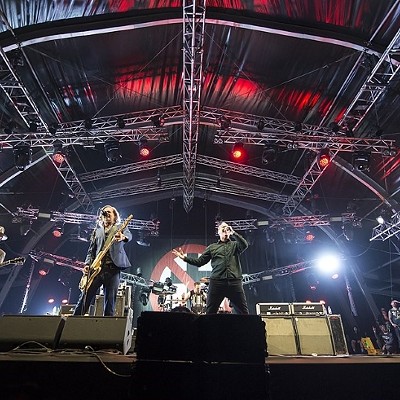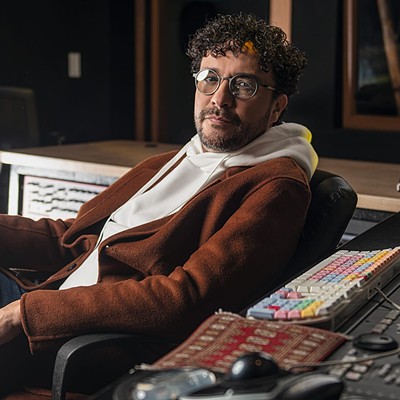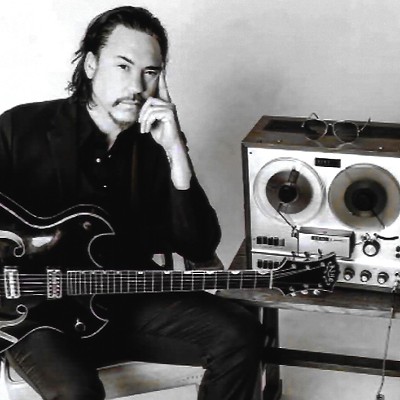Jimmy Webb has written scores of songs that have been recorded by some of history's all-time best-selling artists, but only one has a special place in Southeast Texas's collective heart. Before you go reaching for that almanac, it's “Galveston,” which Webb wrote at the height of the Vietnam War. He adopted the POV of a soldier who flashes back to romantic encounters by the Gulf to help get over his dread of dying in combat.
Webb's longtime friend and muse, Glen Campbell, took “Galveston” to No. 1 in 1969, but only after taking some liberties with his original arrangement, the author notes today. It'll be front and center during his solo performance this evening at the MATCH, dubbed “An Evening With Jimmy Webb.”
“I play it for the audience the way I wrote it, which is kind of elegiac and more subdued than Glen’s rip-roaring, uptempo version of the song,” Webb says while traveling near Reading, Pennsylvania, one day last week.
Not surprisingly, “Galveston” became especially beloved by members of the armed services. According to Webb, the sailors aboard two U.S. Navy warships stationed in the South China Sea, the cruiser USS Galveston and the replenishment oiler USS Wichita, used to stage a mock musical battle on the open seas using his songs. As it awaited refueling, the Galveston would play “Galveston” over its PA to the approaching Wichita, which responded by blasting “Wichita Lineman.”
“I’d have these guys coming up to me after my shows and saying, ‘Man, thanks for writing that song ['Galveston']. That got me through some bad moments,’ Webb reflects. “So every song is connected to real people and real lives.”
Webb, now 69, drew on his own childhood when choosing the setting for “Galveston.” Born in Oklahoma, he spent a good part of his childhood moving around West Texas. His father, a Baptist minister, studied at Fort Worth's Bible Baptist Seminary before moving his family around tiny places like Wellington, Pampa and Quanah, Webb recalls.
“I was always fascinated with the Gulf, and I got a chance to see the big water a couple of times with my dad,” he says. “I used to do evangelical stuff; go out and do revivals and stuff with my dad, so I got to see the water and the big boats and everything. I always remembered that, so when I started writing this song, I wanted to write a song about a blue-collar guy. My hero is just a regular guy, and that’s the guy I write about most of the time.”
In his five decades as one of American pop's most prolific and decorated songwriters, Webb has moved in some pretty rarefied circles. One brought him to London to record an album with the late Sir George Martin, legendary producer of the Beatles as well as Jeff Beck, ELO, Sir Elton John and many others. Sometimes Webb would keep a piano in his hotel room, which came in handy on that trip because, to hear him tell it, another of his other signature songs was just a “rip-roaring nightmare” away.
“One night I had a bizarre dream where I was being chased by these soldiers,” Webb says. “It was extremely realistic, and I knew that if they got me, they were gonna kill me. It was one of those cold-sweat dreams — you wake up, the sheets are wet. It was one of those things. By some chance I had a piano.”
And the makings of “Highwayman,” which would eventually become another of Webb's biggest hits and win him a Grammy. There are many others: “MacArthur Park,” “Up, Up and Away,” “By the Time I Get to Phoenix,” “The Moon Is a Harsh Mistress” and “Someone Else,” which Webb wrote at age 13 and was later recorded by Art Garfunkel on 1974's Watermark album. But back to “Highwayman,” which someone somewhere once called “the first existential country song.”
“I rolled out of bed with this old highwayman story completely etched in my brain,” Webb says. “It was in living color and ready to roll. I started playing that riff in a minor key and I wrote the first verse, and it just seemed to stretch out in front of me. I don’t want to put too fine a point on it – I’m not Shirley MacLaine – but some kind of inspiration led me into the second verse to say, 'I was a sailor, and I was born upon the tide/ with the sea I did abide,' and it went on and on.”
Webb's version of the song indeed wound up on 1977's Martin-produced El Mirage album. When he got back to L.A. after finishing the record, one of the first people to hear it was Glen Campbell. The two men's careers are so intertwined that Webb has another touring show, entirely different from the one he'll do tonight, based around Campbell's versions of his songs; he'll do it at Campbell's 80th birthday party May 3 at Nashville's City Winery. Here, Campbell asked if he could record “Highwayman” and Webb agreed (“I was loath to tell him he couldn't”), but when Campbell played it for executives at Capitol Records, his label at the time, the reaction was not what the singer expected.
“[He] played it for them and they turned up their nose at it and said, ‘We want to point you in this direction,” recounts Webb. “They played him ‘My Sharona’ by the Knack. Glen got up and walked out of Capitol forever. He never went back.”
Some time afterward, Webb continues, Campbell was in Nashville and visited Waylon Jennings, Willie Nelson, Kris Kristofferson and Johnny Cash at a recording session one night. They were trying to finish an album together, but having trouble finding worthwhile songs to put on it. Cash was ill and their record company, RCA, was leaning on them to finish the record. Campbell told the four legends, 'Hey, fellas, I think I've got one for ya.'
“He sat down and played ‘Highwayman’ for them,” Webb says. “It was their single, and it earned me a Grammy for Best Country Song. When I told Waylon I got a Grammy for Best Country Song for ‘Highwayman,’ he said, ‘Which country is that?’
“But that’s an example of the path that a song takes,” continues Webb, whose “Evening With..” show is designed around origin stories like that one. “It ricochets around the kind of pinball machine of the industry, and it’s sheer luck if it happens to land on the block 19 and it’s a winner.
“It’s not all about talent; it’s not all about craftsmanship,” demurs Webb, whose 50-year repertoire nonetheless boasts an abundance of both qualities. “A lot of times it’s just blind luck.”
Jimmy Webb performs at 8 p.m. tonight at MATCH, 3400 Main.
Support Us
Houston's independent source of
local news and culture
account
- Welcome,
Insider - Login
- My Account
- My Newsletters
- Contribute
- Contact Us
- Sign out
[
{
"name": "Related Stories / Support Us Combo",
"component": "11591218",
"insertPoint": "4",
"requiredCountToDisplay": "4"
},{
"name": "Air - Billboard - Inline Content",
"component": "11591214",
"insertPoint": "2/3",
"requiredCountToDisplay": "7"
},{
"name": "R1 - Beta - Mobile Only",
"component": "12287027",
"insertPoint": "8",
"requiredCountToDisplay": "8"
},{
"name": "Air - MediumRectangle - Inline Content - Mobile Display Size 2",
"component": "11591215",
"insertPoint": "12",
"requiredCountToDisplay": "12"
},{
"name": "Air - MediumRectangle - Inline Content - Mobile Display Size 2",
"component": "11591215",
"insertPoint": "4th",
"startingPoint": "16",
"requiredCountToDisplay": "12"
}
,{
"name": "RevContent - In Article",
"component": "12527128",
"insertPoint": "3/5",
"requiredCountToDisplay": "5"
}
]
KEEP THE HOUSTON PRESS FREE...
Since we started the Houston Press, it has been defined as the free, independent voice of Houston, and we'd like to keep it that way. With local media under siege, it's more important than ever for us to rally support behind funding our local journalism. You can help by participating in our "I Support" program, allowing us to keep offering readers access to our incisive coverage of local news, food and culture with no paywalls.
Chris Gray has been Music Editor for the Houston Press since 2008. He is the proud father of a Beatles-loving toddler named Oliver.
Contact:
Chris Gray
Trending Music
- Country Rock Thrives with Gene Clark and Flying Burrito Brothers for Record Store Day
- Bruce Robison Is The Eternal Song Hunter
- Top 10 Butt-Rock Bands of All Time
-
Sponsored Content From: [%sponsoredBy%]
[%title%]

Don't Miss Out
SIGN UP for the latest
Music
news, free stuff and more!
Become a member to support the independent voice of Houston
and help keep the future of the Houston Press FREE
Use of this website constitutes acceptance of our
terms of use,
our cookies policy, and our
privacy policy
The Houston Press may earn a portion of sales from products & services purchased through links on our site from our
affiliate partners.
©2024
Houston Press, LP. All rights reserved.





